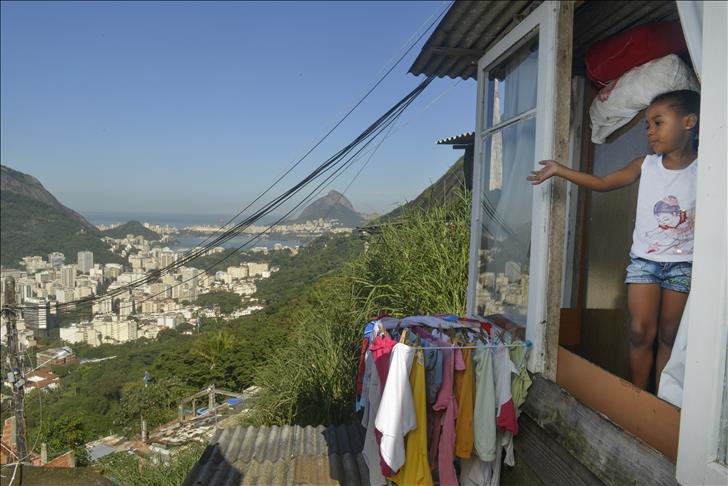
BRASILIA, Brazil
Early on a warm January morning in central Rio de Janeiro, close to the famed Maracanã stadium, young mother Marilene was one of those watching representatives from the city government arrive in her community, unannounced, to demolish their houses.
"It was a war scene," Marilene told RioOnWatch, launched in May 2010 to track evictions and bring visibility to the shanty town communities known as favelas in the lead-up to the 2016 Olympics. Marilene had been living in Metrô in an abandoned house in the favela community, for about a year and a half. "Police fired tear gas everywhere. Children were being sick. It was terrible."
Twelve houses were demolished in Metrô on January 8, some of which still had occupants' belongings lying inside.
Forced evictions like this one have been common during preparations for the 2014 World Cup and 2016 Summer Olympics, activists and non-government organizations (NGOs) say.
While FIFA claims that no one has been evicted because of stadium construction, Chris Gaffney, a professor and geographer at Rio’s Fluminense Federal University who specialises in the history and culture of football stadiums disputes this fact. He says that the mega-events including the upcoming World Cup and Olympics have prompted "multiple projects" in each city.
"These have been the cause of massive evictions in nearly all of the host cities," Gaffney said.
Activists and NGOs tracking evictions estimate that preparations for the World Cup and the Olympics could cause the eviction of as many as 170,000 people throughout Brazil, as cities take advantage of the frantic building boom and deadline pressure to raze slums and favela communities.
"The reality is that all mega-events bring with them what is known as a 'state of exception,'" explained Theresa Williamson, executive director of Catalytic Communities. "Because of deadlines and strict rules and requirements, an exception to existing legislation is created and you get a period where local authorities can implement whatever they want to do."
In Rio, Williamson says, this has resulted in thousands of evictions and attempted evictions of favela residents -- whose communities often lie on prime real estate -- that directly contradict Brazilian law.
"They are not legal. Brazil actually has some of the strongest housing rights on the books," Williamson said, citing a law that allows an occupant to legal rights to a property after five years of living there.
"These favelas are consolidated, historical communities, these are not new squatter settlements," Williamson said, adding that one favela threatened with eviction was 117 years old.
"That’s why the court processes are working in some communities, but some don’t know their rights."
One community that has seen a measure of success in campaigning against its eviction is Villa Autódromo, a waterside community founded in the early 1960s that abuts land reserved for the 2016 summer Olympic village. In 1994, the 4,000 residents of Villa Autódromo were granted 99-year leases to their homes. Even so, in 2009 the community learnt, through reports in the media, that they would be evicted.
They launched a formidable campaign to stay in their waterside community. They organised protests, made videos, engaged social media, and wrote a proposal -- the Plano Popular da Vila Autódromo -- that outlined their rights. Last August, Rio’s mayor, Eduardo Paes, paused immediate plans for the community’s eviction, and agreed to talks.
Williamson attributes Paes' sudden, and very publicised, willingness to meet with favela dwellers to his plummeting popularity at that time, coming as it did weeks after June’s huge street protests.
"The protests gave Vila Autodrome leverage. The mayor’s popularity dove from very high to very low, and this community is emblematic of the struggle [outlined by some protesters] so I think he deemed it politically important."
"It's a success story in that the community is still standing," said Williamson, "but the issue is no means resolved."
- Protests planned this weekend, likely to multiply in coming months
Street protests against the 2014 World Cup are planned in cities across Brazil this Saturday, marking the first demonstrations against the tournament this year. Facebook pages for protests in various cities have been created, including in capital Brasília, Vitoria and São Paulo, where almost 20,000 people have said that they will attend.
Increased protests and social mobilization in the coming months, and during the Cup, are "inevitable," says Gaffney. "The degree to which the games themselves are interrupted depends largely on the police reaction."
The government, keen to present an orderly appearance to the international media, and wary of protests turning violent, has been training troops to handle disturbances peacefully.
But the government has offset this positive move, Gaffney says, by contracting a 10,000-strong special riot force to control protests anticipated during the World Cup.
"The government is prepared to act with violence against protesters and they have spent nearly R$2 billion ($835 million) on personnel, technology and armaments," Gaffney said. "The World Cup is militarizing even more Brazil's police force and declaring citizens insurgents or even terrorists."
By Lucy Jordan
englishnews@aa.com.tr
Anadolu Agency website contains only a portion of the news stories offered to subscribers in the AA News Broadcasting System (HAS), and in summarized form. Please contact us for subscription options.

